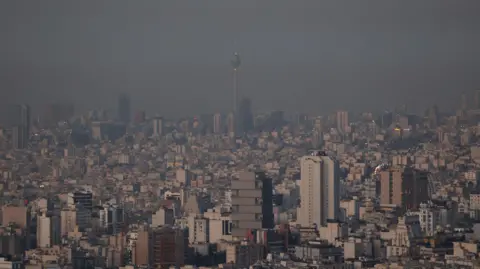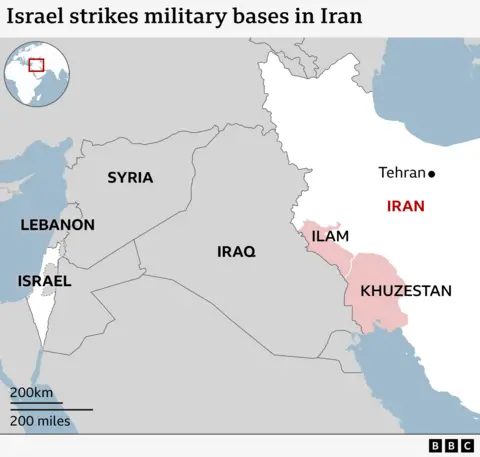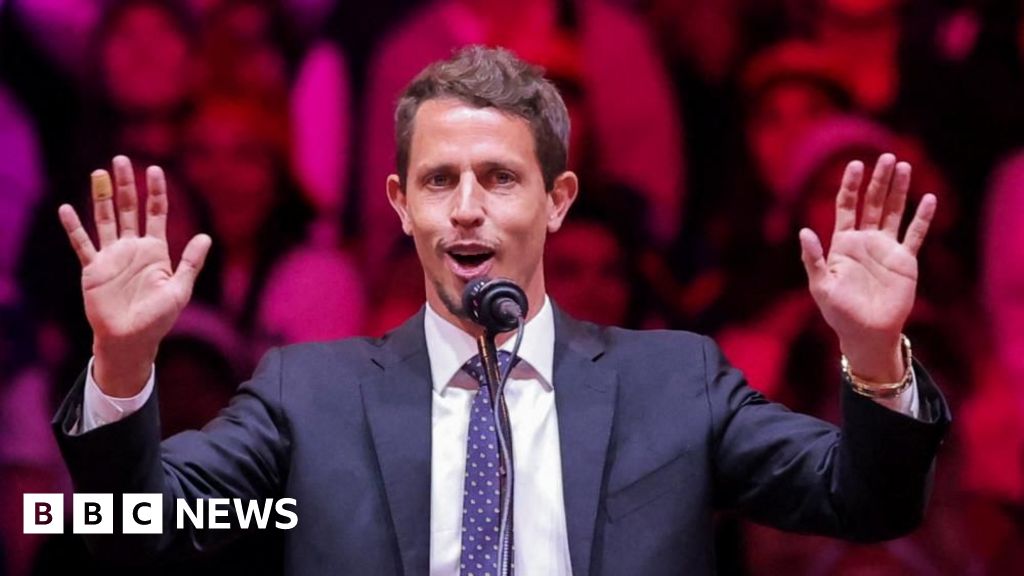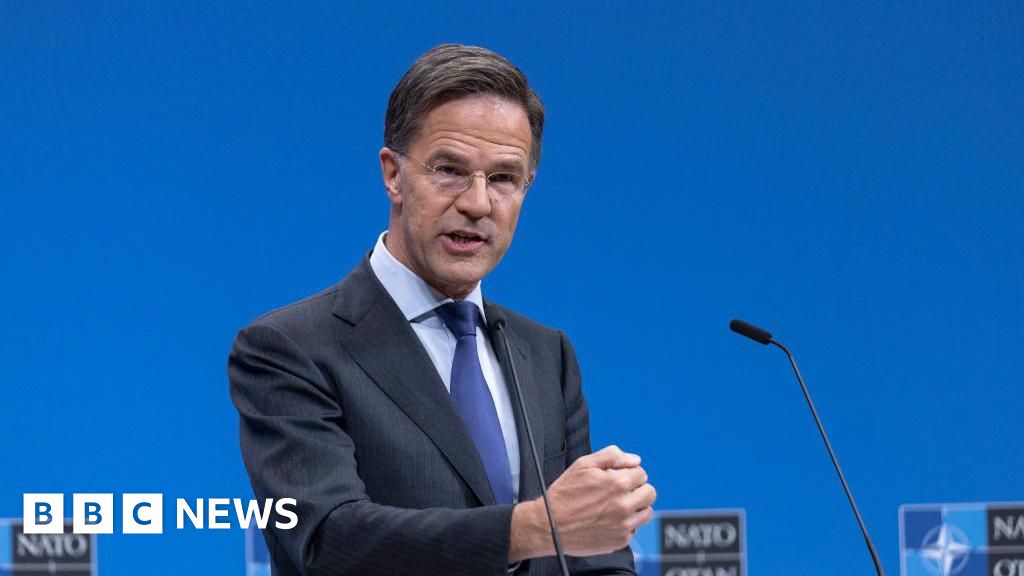Place your adverts here on InfoDig @ low rates; banner ads, sponsored links and guest articles etc. Contact us

 Reuters
Reuters
Israel carried out what it described as “precise and targeted” airstrikes on Iran on Saturday, in retaliation for the barrage of strikes launched by Tehran against Israel earlier this month.
The Israel Defense Forces (IDF) said it targeted military sites in several regions, with subsequent reports suggesting an Iranian missile production site had been hit. One civilian and four soldiers were killed in the attacks, the Iranian military said.
It marks the latest in a series of attacks between the two regional foes that for months have raised fears of an all-out war.
Here’s what we know.
How did the attacks unfold?
At around 02:15 on Saturday (22:45 GMT on Friday), Iranian media reported explosions in and around the capital, Tehran.
Video uploaded to social media, and verified by the BBC, showed projectiles in the sky over the city, while residents in some areas reported hearing loud booms.
The IDF's strikes, which came in several waves over a three-hour period, involved scores of aircraft, including jets and drones.
Targets comprised Iran’s air defences, missile and drone production, and launch facilities. Two researchers, analysing satellite imagery, told Reuters news agency that Israel had struck buildings in Parchin, a military complex near Tehran, and may have "significantly hampered Iran's ability to mass produce missiles".
Israeli Prime Minister Benjamin Netanyahu - who followed the operation from the IDF’s command and control centre in Tel Aviv - said Israel had "severely damaged Iran’s defence capability and its ability to produce missiles".
"This regime must understand a simple principle: whoever hurts us, we hurt him," he added.
The White House described the strikes as an "exercise of self-defence". A senior administration official said the US had worked with Israel to encourage a "targeted and proportional" response.
They also said the attacks did not damage Iranian oil infrastructure or nuclear facilities - targets President Joe Biden had urged Israel not to hit.
What was the scale of the attacks?
Iran has largely played down the impact of the strikes - which hit sites in Tehran, Khuzestan and Ilam provinces - saying most missiles were intercepted and those that were not caused "limited damage".
BBC Verify has identified damage at a defence ministry base to the east of Tehran, and at an air defence base to the south.
Iranian Supreme Leader Ali Khamenei, in a measured response, said the attacks should not be "exaggerated or downplayed".
"It is up to the authorities to determine how to convey the power and will of the Iranian people to the Israeli regime," he said on Sunday, "and to take actions that serve the interests of this nation and country."
Meanwhile, the IDF said it had hit around 20 targets, with Netanyahu describing the attack as "precise and powerful" and having "achieved its goals".
The Iranian military confirmed that four soldiers had died - and state news agencies reported the death of one civilian.


Why did Israel attack Iran?
Iran is the primary backer of a range of groups across the Middle East - often described as proxy groups - that are hostile to Israel, including Hamas and Hezbollah, which Israel is currently at war with.
In April, Iran launched its first direct attack on Israel, with about 300 missiles and drones, in retaliation for an Israeli air strike on an Iranian embassy compound in Syria that killed several top commanders from Iran’s Revolutionary Guard Corps (IRGC).
Israel responded with a “limited” strike on a missile defence system in the Iranian region of Isfahan, which Iran chose not to respond to.
Later, in July, Israel killed a top Hezbollah commander in an air strike on Beirut. The next day, Hamas political leader Ismail Haniyeh was killed in an explosion in Tehran. Iran blamed Israel, though Israel did not comment.
In late September, Israel assassinated Hezbollah leader Hassan Nasrallah and Brig-Gen Abbas Nilforoushan, a high-ranking Iranian official, in Beirut.
On October 1, Iran launched about 180 ballistic missiles at Israel, which it said was in response to the deaths of Haniyeh, Nasrallah and Nilforoushan.
This latest attack on Iran is Israel's response to that.
What happens next?
Netanyahu's office denied a report by US outlet Axios that prior to the attacks, Israel sent Iran a message revealing certain details about the strikes, and warning Tehran not to respond.
"Israel did not inform Iran before the attack - not about the time, not about the targets, not about the strength of the attack," the prime minister's spokesperson said.
Still, the strikes were more limited than some had been expecting.
The IDF said in a statement that it is "focused on our war objectives in the Gaza Strip and Lebanon. It is Iran that continues to push for a wider regional escalation".
A senior US official said "this should be the end of this direct exchange of fire between Israel and Iran".
Iran’s foreign ministry said it was "entitled and obligated to defend itself" and described the attack as a violation of international law.
But it also said that Tehran recognises its "responsibilities towards regional peace and security".
What has been happening inside Iran?
Images published by Iranian state media over the weekend showed life continuing in relative normality - with busy streets, people exercising in parks, and fruit and vegetable markets open as usual.
Iran closed its airspace for a few hours, but it later reopened.
There are, however, signs that the Iranian government is keen to play down the impact of the attacks.
The IRGC has announced that it is a criminal offense to send “images or news” related to the attack to outlets that it deems "Israel-affiliated" or "hostile”. Usually, Iran refers to Western media as hostile.
Iranian media reported over the weekend that Tehran's Prosecutor Office has filed charges against an unnamed website for “covering issues counter to national security".
How has the world responded?
US National Security Council spokesman Sean Savett said Israel’s response “avoided populated areas and focused solely on military targets, contrary to Iran's attack against Israel that targeted Israel's most populous city".
But Washington’s aim, he added, is “to accelerate diplomacy and de-escalate tensions in the Middle East region".
UK Prime Minister Sir Keir Starmer said Israel had the right to defend itself, but urged all sides to “show restraint” and called for Iran not to respond.
Saudi Arabia condemned the attack, and warned against any action that "threatens the security and the stability” of the region.
Egypt's foreign ministry echoed those concerns, saying it was “gravely concerned” by the strikes.
Hamas described them as "a flagrant violation of Iranian sovereignty, and an escalation that targets the security of the region and the safety of its peoples".
Additional reporting by Ghoncheh Habibiazad, BBC Monitoring

 2 hours ago
16
2 hours ago
16












